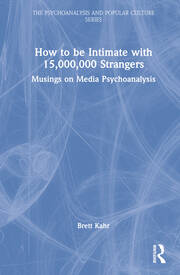On 31st May, 2023, Professor Brett Kahr’s seventeenth book will be published, entitled
How to Be Intimate with 15,000,000 Strangers: Musings on Media Psychoanalysis.
This book describes the relationship between psychoanalysis and the media, and chronicles Kahr’s own work as a mental health broadcaster, having worked as Resident Psychotherapist at the British Broadcasting Corporation and having appeared on over 1,000 radio and television programmes over the years.


Professor Brett Kahr
This new publication appears in the “Psychoanalysis and Popular Culture Series”, edited by Professor Caroline Bainbridge and Professor Candida Yates, founder of “Media and the Inner World” – a project commissioned by the Arts Research Council, which has integrated mental health workers with cultural practitioners and academics.
Endorsements.
“No one has done more to lead psychoanalysis out of the closet and into the hearts and minds of 15,000,000 – and counting – than the brilliant Professor Brett Kahr. Readers are in for a treat, because he does so in beautiful, accessible language, never compromising theoretical or ethical rigour; a rare, impressive feat.”
Dr. Steven Kuchuck, Immediate Past President of the International Association for Relational Psychoanalysis and Psychotherapy, and Faculty, New York University Postdoctoral Program in Psychotherapy and Psychoanalysis and the National Institute for the Psychotherapies.
*
“This is a rare and special treat … a gem of a read. Professor Brett Kahr combines his scintillating Freudian intellect with his forty years of experience, in radio and television, to put media itself on the couch, revealing a whole gamut of captivating insights. An absolute delight!”
Dan Chambers, Creative Director and Co-Founder of Blink Films (one of Real Screen 100’s Top 5 Non-Scripted U.K. Indies) and former Director of Programmes, Channel Five Television.
*
“Brett Kahr invites us on his extraordinary journey of popularising psychoanalysis through the media. Writing with clarity, humour, empathy, and great warmth about his long experience as the United Kingdom’s foremost media psychoanalyst, he details his adventures on television and radio as well as sharing wide-ranging reflections about celebrity culture and the history of mediated psychoanalysis. Kahr thereby contributes enormously to dissolving the secretive aura of psychoanalysis while being deeply respectful to the boundaries of a private profession. At a time where psychoanalysis through popular culture is more needed than ever, this book is essential reading for clinicians, academics, and anyone concerned about the shared future of humanity and psychoanalysis.”
Professor Jacob Johanssen, Associate Professor in Communications, St. Mary’s University, and author of Fantasy, Online Misogyny and the Manosphere and co-author of Media and Psychoanalysis: A Critical Introduction.
*
“How to Be Intimate with 15,000,000 Strangers: Musings on Media Psychoanalysis makes a unique contribution to clinical media psychology. Professor Brett Kahr has devoted his career to the dissemination of complex psychoanalytical concepts among the general public. In this book, he uses creative and courageous means to demystify, destigmatise, and demarginalize psychoanalysis through his collaborations with the media. Entertaining and educational, this work inspires psychotherapists and psychoanalysts to venture beyond the consulting room and to provide public outreach.”
Professor Caroline Sehon, Director of the International Psychotherapy Institute, and Clinical Professor of Psychiatry at Georgetown University Medical School, as well as Executive Committee Board Member and Chair of the Committee on Community Psychoanalysis of the American Psychoanalytic Association.
*
“As Radio 2’s Resident Psychotherapist, Professor Brett Kahr was one of the first brave pioneers who championed mental health on the B.B.C.’s airways, thus fulfilling the B.B.C.’s remit to “inform, educate and entertain”. His insights have paved the way to destigmatising mental illness and have forever changed the landscape of media psychoanalysis.”
Jenny Slater, Music Project Manager, European Broadcasting Union, B.B.C. Radio.








